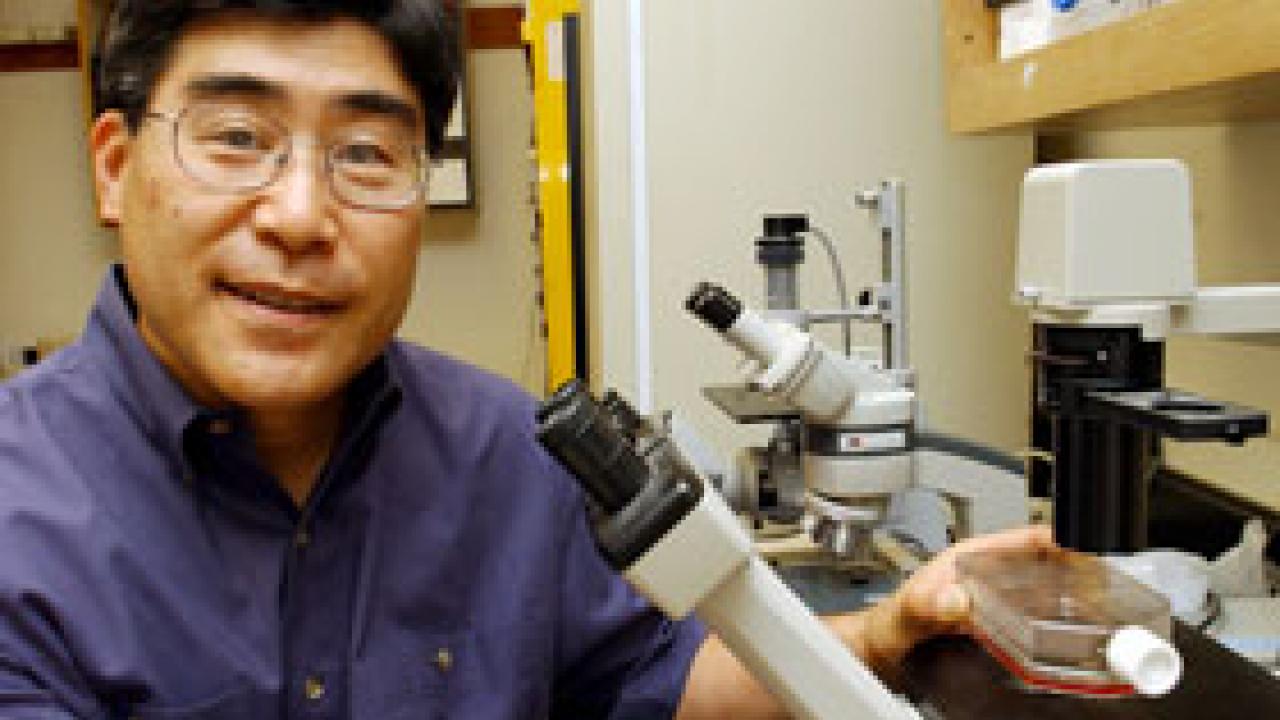Who leaps to mind when you think of someone appearing on the Pavilion (formerly Recreation Hall) intramural Wall of Fame more than a dozen times? Perhaps a super-athlete student who dominates every sport with blazing speed, incredible jumping ability and an intense competitive fire?
Try instead Earl Sawai, a soft-spoken 46-year-old AIDS researcher and associate adjunct professor of medical pathology at the UC Davis School of Medicine.
Sawai has won 14 intramural championships since 1997, captaining softball and basketball teams of graduate students, staff and fellow faculty. His championships include this spring's three-on-three basketball tournament during which his Wash Cows (consisting also of other team members Jeffery Bethel, Mark Heffernan and Michael Cooper) faced mostly youthful undergraduate competitors.
"Our team was probably the oldest in the tournament," Sawai says. "I think the younger teams thought we'd be old and slow." His team doesn't look to teenage speed for its competitive edge though. "Experience," he notes, is their ace in the hole.
Sawai's real work on campus, though less visible and earning him no pictures in Rec Hall, is significant in the world health venue. He and the four graduate students working in his lab are attempting to identify the mechanisms of how the HIV virus causes disease. More specifically, they are studying a protein called Nef and how it is important for the ability of Simian Immunodeficiency Virus (SIV) to cause disease in macaque monkeys.
"The ultimate goal is to identify how we can interrupt Nef function and design drugs against the protein," Sawai says.
Sawai first developed an interest in AIDS while doing post-doctoral work at UC San Francisco. There, he worked with Jay Levy, co-discoverer of the HIV virus. Sawai decided he wanted to study AIDS in animals, making Davis the logical place for him to turn. "Davis is uniquely situated because it has a veterinary school, a medical school and a primate center that can interact," he says. "We're able to do many of our experiments at the primate center."
Outside of his research, Sawai also co-teaches one graduate-level class on retroviral pathogenesis, the study of how retroviruses cause disease.
He also enjoys growing squash, zucchini, tomatoes, garlic, cherries, peaches, nectarines, figs and oranges in his "small, intensely cultivated postage-stamp-size garden"at home. But his first love is sports. He plays basketball two or three days a week at 7 a.m. and puts together both co-ed and men's softball and basketball teams each year. Those teams, which Sawai calls "an aggregation of players from the medical school, veterinary school, the center for comparative medicine, primate center, veterinary medicine central services and food science.
"We've been fortunate enough to have good players, and it's been a lot of fun," he says. "I've gotten to know people from other departments that I wouldn't have otherwise met."
Sawai's wife, Carolyn, who works in the Office of the Vice Chancellor for Research, is an aerobics enthusiast, Earl says. "She's much more athletic than me," he adds with an easy smile.
What's the best thing about your job?
Watching graduate students mature and develop scientifically until they get to the point where they can conduct research on their own.
And the worst?
The most challenging thing I have to deal with is getting research funding from the government in these tough economic times. Our area is an important issue to the health of the world, so we've been noticed and we've been surviving.
What's the biggest issue in your field today?
The fact that AIDS is continuing to spread throughout the world. The drugs aren't getting out to everyone. There's also the issue of education in developing countries. We have to educate people about how the virus spreads and about unsafe practices that help it continue to spread. Sometimes people's habits and customs must be changed, which is a difficult thing to do.
Read any good books lately?
Lately I've been reading books about the internment of Japanese Americans in World War II. I liked Farewell to Manzanar by James and Jeanne Houston, but I've been reading non-fiction as well. My grandfather and my father were interned in Topaz, Utah, during the war, and I want to learn more about their experiences. They lost all their property and had to start life all over again in a discriminatory climate. So it's not just my cultural history, but my family history.
Who inspires you?
My father, George Sawai, has been a major inspiration. After he left the internment camp, he earned his bachelor's degree from the University of Utah then went to New York City and earned an MBA at New York University. It took a lot of courage to move across the country independently during a very tumultuous time. While he was in New York, he also met Senator Jacob Javits and influenced him to, in the 1950s, introduce a special bill, HR 8400. It allowed my grandmother, who had been in Japan during the war, to come to the United States.
What's something surprising about you?
My way of taking out frustration is hitting softballs or golf balls. Whenever I have some pent up frustration, I go to the driving range or the batting cages. It's very therapeutic. When you see the ball going very far and straight, it's almost a Zen-like feeling.
What's your guilty pleasure?
I like to eat, probably more than I should. I love Japanese food, but just about any food is fair game.
If you had three wishes, what would they be?
One: peace for the world; two: a cure for AIDS; and three: better health for my dad. •
Media Resources
Amy Agronis, Dateline, (530) 752-1932, abagronis@ucdavis.edu
